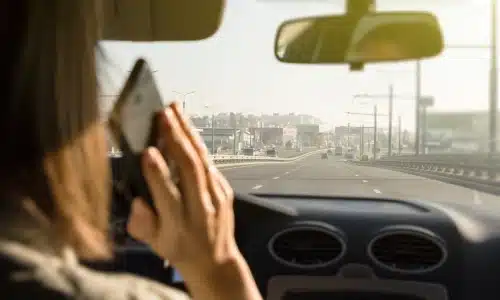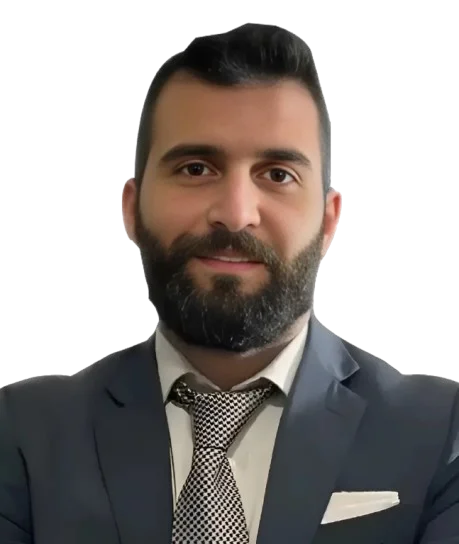
If you or a loved one has been impacted by such an incident in Charleston, you need a dedicated legal advocate who understands the complexities of these cases. At the CEO Lawyer Personal Injury Law Firm, our distracted driving accident legal team serving Charleston helps protect the rights of those injured due to the negligence of others.
With a commitment to early investigation and careful preservation of evidence, we work to prepare every case thoroughly to pursue the compensation our clients may be entitled to. If you’re facing the aftermath of a distracted driving accident, it’s essential to act promptly.
Contact us today to protect your legal rights and begin the process of recovery.
What Is Distracted Driving?
Distracted driving is any function that diverts a driver’s attention away from the road. This includes taking your eyes off the road, your hands off the wheel, or your mind off driving.
With the rise in cellphone usage for communication and daily tasks, distracted driving accidents have become more common.
However, cell phones are not the only dangers; activities like eating, adjusting the radio, or talking to passengers can also lead to dangerous distractions. Any action that takes a driver’s focus away from driving significantly increases the likelihood of a collision, endangering everyone on the road.
How Can Our Distracted Driving Accident Attorney Serving Charleston Help Clients?
Proving distracted driving as the cause of an accident is essential for securing just compensation in personal injury cases. A legal team skilled in handling such claims employs various methods to establish the negligence of the distracted driver.
- Collection of Evidence: The initial step involves gathering concrete evidence. This may include obtaining the police report, which could highlight any citations for distracted driving issued at the scene or contain observations from officers about the driver’s state. Additionally, photographs or videos from traffic cameras or bystanders that capture the moments leading up to the accident can be pivotal.
- Witness Testimonies: Eyewitness accounts are beneficial. Witnesses can provide firsthand details about the driver’s behavior, such as seeing the driver using a phone, eating, or engaging in any other activities that diverted their attention from the road.
- Technological Data: Accessing cell phone records is another critical avenue. These records can show if the driver was texting, calling, or using apps at the time of the crash. Modern vehicles equipped with data recorders can also provide information about vehicle performance and driver actions seconds before the collision.
- Detailed Analysis: A reconstruction professional may be brought in to analyze the collected data and recreate the scenario, demonstrating how the distraction caused the accident. This testimony can be a powerful tool in showing the direct impact of the driver’s distraction.
- Driver Admissions: In some cases, the driver may admit to being distracted. Such admissions, whether made at the accident scene, during a deposition, or in other communications, can directly link their distraction to the accident.
- Legal Advocacy: A distracted driving accident legal team serving Charleston can use all these elements to build a strong case. They handle the complexities of the legal system and work to ensure that all potential sources of evidence are explored and applied effectively.
How Our Distracted Driving Accident Lawyer Serving Charleston Can Help
When you work with us, the CEO Lawyer Personal Injury Law Firm legal team will take much of the stress and groundwork of a car accident claim off your shoulders. Our legal team will handle everything from managing deadlines and technical requirements to negotiating with the insurance company, gathering evidence, interviewing witnesses, and building the strongest case on your behalf.
Our client-centered approach means your legal team will get to know you personally. We understand the stress you are under and know a successful case starts with empathetic and engaged listening to fully understand your experience.
Our car accident legal team serving Charleston values clear communication and dedicated representation. We will work hard to advocate for you and present your story with the care and commitment you deserve.
The earlier we can get started, the better opportunity we will have to gather evidence while it is available and speak to witnesses while their memories are fresh. Don’t delay—it’s free and with no obligation, so you have nothing to lose by learning more about your rights.
What Are the Three Types of Distracted Driving?
“Distracted driving” broadly describes any behavior that causes a driver to take their attention away from safely operating their vehicle.
Not all distracted driving is necessarily illegal or results in a traffic ticket. In the context of a personal injury claim, an accident victim only needs to prove that a distracted driver was negligent, not criminal.
Three main types of distracted driving often lead to accidents:
- Visual Distractions: These divert the driver’s eyes from the road. Examples include looking at a phone, glancing at passengers in the back seat, or spending too much time looking at a GPS or other in-vehicle screen.
- Manual Distractions: These involve taking the driver’s hands off the steering wheel. Texting while driving is one of the most common examples, but eating, drinking, or smoking while driving also falls under this category.
- Cognitive Distractions: These occur when the driver’s mind is not focused on driving. This may include driving while emotionally upset, fatigued, intoxicated, or under the influence of drugs.
Under South Carolina law, it is illegal for any driver to use a wireless electronic communication device to compose, send, or read a text-based communication while operating a motor vehicle.
Even if these drivers do not cause an accident, they can still be stopped by the police and fined. Evidence of texting while driving can also be used against a driver in a personal injury lawsuit following a collision.
What Are the Top Ten Causes of Distracted Driving?
Roughly 25 percent of car accidents result from distracted driving. According to the Fatality Analysis Reporting System (FARS), the ten major causes of distracted driving accidents are:
- Lost in thought: Daydreaming or being lost in thought diverts attention from the road.
- Cellphone use: Talking, texting, or using a phone while driving is a significant distraction.
- Exterior event, object, or person: Looking at something outside the vehicle, such as an accident or a billboard.
- Passengers: Interacting with passengers can take focus away from driving.
- Reaching for an object in the car: Trying to grab something from the back seat or the floor.
- Drinking and/or eating: Consuming food or beverages while driving.
- Adjusting the radio or A/C: Changing the radio station or adjusting the air conditioning.
- Adjusting other devices inside the car: Fiddling with GPS, entertainment systems, or other in-car devices.
- Moving objects inside the car: Dealing with items that shift or fall while driving.
- Smoking: Lighting, smoking, or extinguishing a cigarette.
After a car accident, it’s important to seek all necessary medical attention, including doctor visits and treatments. You should also consult with a car accident legal team serving South Carolina before signing any documents or making statements, to ensure your rights are protected.
How to Prove Fault in a Distracted Driving Accident
Proving that a driver was distracted and at fault for an accident involves gathering various evidence. Here are key pieces of evidence that can demonstrate distracted driving:
- Police Reports: Call the police immediately after a car crash. They will secure the scene and document crucial facts, including collecting information from all involved drivers. They may note evidence of distracted driving, such as food-related trash or a cell phone open to a messaging app.
- Photographs and Video Footage: Images and video footage can document the scene and help recreate the accident to determine its cause. Surveillance cameras or eyewitness devices can provide critical evidence of distracted driving in a trial.
- Phone Records: Texting or talking on the phone are common forms of distracted driving. Phone records can provide valuable evidence. If there is an indication that a driver was using their phone leading up to the crash, your legal team can subpoena the driver’s cell phone records for any activity during the accident and its lead-up.
- Eyewitness Accounts: Speaking to witnesses and getting their contact information at the scene can benefit your case. Witnesses may have seen the other driver engaging in distracted driving behaviors, such as eating, drinking, or texting. Police should also speak with any eyewitnesses at the scene and record their versions of events.
- Expert Testimony: Expert testimony can be crucial in proving fault. Experts can review the case and testify on your behalf, reconstructing how the accident occurred based on evidence collected at the scene and eyewitness accounts.
Our distracted driving accident legal team serving Charleston works with a network of professionals who can review your case and testify on your behalf. Using this evidence, we can build a strong case to prove the other driver’s distraction and help you pursue fair compensation.
What Is the Worth of Your Charleston Distracted Driving Case?
The value of a distracted driving case in Charleston can vary widely, depending on several key factors. Here are some of the primary considerations that can influence the potential compensation you might receive:
- Severity of Injuries: The extent and severity of your injuries play a crucial role. More severe injuries typically result in higher medical bills, extended recovery times, and greater non-economic damages like pain and suffering, all of which can increase the value of your claim.
- Liability and Fault: If liability is clear and the distracted driver is clearly at fault, the potential for a higher settlement increases. South Carolina’s comparative fault rule means that if you are partially at fault, your compensation may be reduced proportionally to your degree of fault.
- Insurance Coverage: The at-fault driver’s insurance policy limits are also a critical factor. If their policy limit is high, there might be a larger pool of funds available for compensation. Conversely, low limits might restrict the amount you can recover, unless additional coverage (like underinsured motorist coverage on your policy) is available.
- Economic Damages: This includes calculable losses such as medical payments, lost wages, and rehabilitation costs. The greater these costs, the higher the potential value of your claim.
- Non-Economic Damages: These include intangible losses like pain and suffering, emotional distress, and reduced enjoyment of life. These can vary significantly based on the impact of the injuries on your daily life.
- Punitive Damages: In cases where the distracted driving was particularly reckless, punitive damages may be awarded to punish the wrongdoer and deter similar conduct in the future. This can significantly increase the value of a case.
To get a more specific idea of what your Charleston distracted driving case might be worth, consider speaking with our distracted driving accident legal team serving South Carolina. We can assess the details of your situation during a free consultation, provide a ballpark estimate, and explain the legal avenues available for pursuing fair compensation.
What Damages Can You Recover for a Distracted Driving Accident?
Damages in a distracted driving accident case may include financial compensation for:
- Medical Expenses: Covering immediate and ongoing medical expenses.
- Future Medical Needs: Accounting for future healthcare needs related to the injury.
- Lost Wages: Compensating for income lost due to the inability to work.
- Reduced Earning Capacity: Addressing long-term impacts on your ability to earn a living.
- Property Damage: Repair or replacement of damaged property.
- Scarring and Disfigurement: Compensation for permanent physical changes.
- Less Enjoyment of Life: Addressing the impact on your quality of life.
- Emotional Pain and Suffering: Compensating for physical and emotional pain.
- Emotional Distress: Covering the psychological impacts of the accident.
If a distracted driving accident results in the death of a family member, pursuing a wrongful death claim may be an option to seek reparation for your profound losses.
The initial step in most personal injury cases involves your legal team conducting a thorough investigation into the accident. Following this, they will draft and send a demand letter to the at-fault party’s insurance provider.
This document details the accident’s circumstances, establishes the legal liability of the insured, and specifies the compensation sought for the damages incurred.
If the insurance company dismisses the possibility of a reasonable settlement, your attorney might recommend proceeding with the matter to a lawsuit. Negotiations can persist even as the lawsuit advances through its pretrial stages.
In the event that your case proceeds to trial, your distracted driving accident legal team serving Charleston will present the evidence and arguments to the jury, advocating for a verdict in your favor and the rightful compensation for your loss.
Take Legal Action With the Help of Our Distracted Driving Accident Attorney Serving South Carolina
Distracted driving often leads to catastrophic accidents.
If you or someone you care about has been injured due to another person’s careless actions behind the wheel, it is important to speak with a distracted driving accident legal team serving South Carolina as soon as possible.
Call us at (864) 664-3865 or book a free initial consultation. We’re here to answer your questions and discuss your legal options.
Distracted Driving Accident FAQ
Will I have to go to court?
Not necessarily. Many cases are resolved through negotiations with insurance companies and legal representatives. You may only need to sign the necessary documents.
What if I can’t pay for a lawyer?
Distracted driving cases are often handled on a contingency basis. The legal team only receives a fixed percentage of the settlement if you win. This way, you don’t need to come up with money upfront; payment is only required if compensation is recovered on your behalf.
What do I say to the insurance companies?
Be truthful and honest, but avoid providing detailed statements without legal guidance. Your legal team can communicate with the insurance companies on your behalf to help protect your rights.





